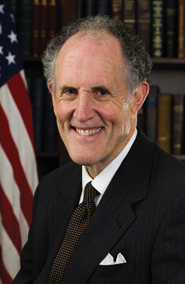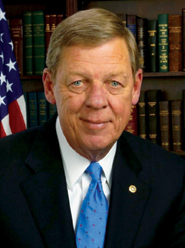Days after sitting down in his office with Traders Magazine, Sen. Ted Kaufman, D-Del., etched his thumbprint on the largest financial reform bill since the Great Depression. Call it "the Kaufman amendment."

The May 5 amendment was short in content and simple in language. But as brief as it was, no one should underestimate its potential far-reaching effects on an industry that trades for the retirement accounts of tens of millions of Americans held in pension and mutual funds.
Securities pros believe the amendment would restrict off-board trading, and consequently end broker internalization and all dark liquidity–or liquidity not displayed on an exchange. Such an alteration would create yet another dramatic overhaul of the equities trading world, which has seen its share of change over the last 13 years–beginning with the Order Handling Rules, then Reg ATS, to penny trading, to the rise of electronic trading and, lastly, Reg NMS. (See the story on the amendment in this month’s Rules & Regs.)
The amendment is not Kaufman’s first foray into the equities markets since taking office in January 2009. He followed former Sen. Joseph Biden, who ascended to the vice presidency, and filled his seat. So far, Kaufman has set his sights on controversial practices–including short sale, flash orders, colocation and high-frequency trading. And the industry is listening.
The MBA Engineer
But why did Ted Kaufman, the 71-year-old newcomer, get so involved in the equities markets? And why now?
After all, he’s not on any of the Senate committees that oversee banking or finance. And while he served as Biden’s chief of staff, he wasn’t really exposed to much legislation in banking or other areas of finance. Biden’s biggest causes focused on the judiciary and foreign relations.
Kaufman lives in Wilmington, Del. He’s been married to the same woman, Lynne, since 1960. He has three daughters and seven grandchildren. He greets people with a ready smile and a level stare. And he is fond of peppering his positions with metaphors.
Furthermore, Kaufman’s a trained engineer with an MBA who has spent most of his career in and around government and academia. He served on Biden’s staff for more than two decades. Yet so far he’s chosen to devote a significant amount of energy to equities market structure for at least half of the two years he will serve in office. And the mantra that has guided his legislative decision-making has been "more transparency."
"Without transparency, there is little hope for effective regulation of our financial markets," Kaufman said.
Regulators have been busy changing the equities markets, Kaufman acknowledged, but have made some mistakes. He expressed disappointment that no regulation over the past few years prevented the precipitous market slide in the first quarter of 2009. Kaufman shook his head as he described how the absence of an uptick rule enabled a wave of short selling to topple the stocks of Bear Stearns and Lehman Brothers. His voice rose when he defended the overall need to have greater scrutiny of trading practices-despite industry resistance.
Uptick Rule Interest
The Kaufman amendment does not target any practice in particular, he said. His goal is to entrench the concept of transparency within all markets. Bringing more transparency to, say, dark pools and high-frequency trading practices would increase fairness and security in the markets, Kaufman said.
Not everyone is convinced that Kaufman is on the right track, though. Security Traders Association chairman Brett Mock is skeptical and concludes that Kaufman’s aim is to create a central limit order book, which the industry has rejected in the past, as such a book would lessen competition.
The reason partly behind Kaufman’s activism stems from being a retail investor himself. He’s been investing for almost 50 years, which includes making some of his own trading decisions. When Kaufman began his two-year Senate term last year, it was just before the Dow Jones Industrial Average plummeted to its lowest point in more than a decade. He learned enough from both to develop strong opinions about the equities markets.

He traces his interest in helping to shape the way stocks trade back to the uptick rule, which the Securities and Exchange Commission abolished in 2007. To his thinking, the uptick rule stood as a sturdy barrier against bear raids for decades. And when the stocks of both Lehman Brothers and Bear Stearns plummeted during the crisis of 2008, it was "predatory bears" selling short without securing the shares beforehand that played a significant role in driving them down, Kaufman said. Subsequently, he made the uptick rule’s return his first cause in the equities markets.
And he’s had allies in this campaign who have trusted his knowledge of the markets. Sen. Johnny Isakson, R-Ga., was one of them. He worked with Kaufman on legislation to bring back the uptick rule and stop naked short selling. Seated in his office, Isakson discussed Kaufman’s expertise and commitment to the cause.
"He is a more recognized authority than I am [on short sale], and I think he was on the right track," Isakson said. "What struck me the most about Sen. Kaufman was the fact that he is such a genuinely good person who is clearly motivated by his desire to do what’s right."
Letter to the SEC
But the SEC’s solution in February, the alternate uptick rule, with its 10 percent circuit breaker, failed to address the problem adequately, both Kaufman and Isakson said. With the alternative uptick rule, after the price of a stock has declined more than 10 percent from its previous close, short sales can only be made at prices higher than the current best bid. Kaufman and Isakson said the uptick rule had worked for decades and were disappointed it wasn’t reinstated.
"There are a number of proposals out there that were a lot closer to the uptick rule than the circuit breaker thing that they finally came up with," Kaufman said.
While researching the uptick rule, Kaufman heard from academics, traders and others in the industry about other practices that had grown in prominence over the past few years. Kaufman declined to identify his sources, as they contacted him on condition of anonymity. But they piqued his interest in such topics as dark pools, flash orders, colocation and high-frequency trading.
"There were a lot of people out there who were saying to me, ‘You think that’s bad, wait until you see this,’" Kaufman said. "And so they started contacting my office and saying, ‘Take a look at this’ and ‘Take a look at that.’ And so things started to evolve from there."
Kaufman also has influence. Late last summer, he called on the SEC to enact a wide-ranging review of the markets. In January, the SEC produced its Concept Release on the equities markets, which could usher in changes. Kaufman, though, denied he forced the commission’s hand in any way.
But he hoped his letter to SEC chairman Mary Schapiro had some effect. Just inside the front door of his senate office, Kaufman has on display a framed Wall Street Journal article about the letter and its call for a closer look at equities market structure and HFT.
"The SEC is an independent agency, and they should be," Kaufman said. "But I do have the right to get into individual cases and say: I think this is important and we should be moving faster on this."
Still, Kaufman’s critics, such as the STA’s Mock, said the senator is making a regulatory issue political. And doing so undermines investor confidence, he added.
"When you base rules on politics, you’re going to get bad rules," Mock said. "Markets evolve, and competition is usually able to solve a lot of problems. And that benefits the end investor with lower transaction costs and lower spreads."
HFTs for Transparency
High-frequency trading has been a major focus of Kaufman’s. He said he likes that the markets are more liquid because of it. But he added that too much of high-frequency trading is opaque. That’s why he supports the SEC’s proposal for a large-trader rule, which calls for tagging orders. Doing so would give regulators, market participants, academics and the media a sense of how much the practice affects prices, he added.
"If we don’t have transparency, we don’t really know if [high-frequency trading] is reducing costs," Kaufman said. "People are going to imagine that it’s reducing costs, but no one really knows if it is, because no one knows what the costs would’ve been without it."
One HFT exec responded that Kaufman has it wrong: HFTs want transparency, too. From concepts such as large trader to colocation, more transparency makes for healthier markets, he said.
"The implication is that we are somehow intentionally blocking transparency, which couldn’t be further from the truth," the HFT exec said. "Disclosure is great. Making it clear what the rules are for colocation is good; we want regulatory oversight assistance in that regard."
Such explanations, however, haven’t swayed Kaufman. He has brushed aside industry studies that purport to show that HFTs have reduced trading costs through narrowed spreads. Narrowing the difference between the bid and ask doesn’t necessarily equate to lower costs for investors if the bid and ask are mispriced, Kaufman said.
"Is there a lot more trading going on? Absolutely," Kaufman said. "Is it more liquid and are you getting better prices? You can say that all you want to, but I want someone to go in there and find out what’s going on."
Looking forward, Kaufman has started to attack the topic of "too big to fail." At one point, he had to break away from our office interview to tape another in the Russell Senate Office Building rotunda with CNN on "too big to fail" and financial reform.
But he’s not through with high-frequency trading, or other issues affecting the equities markets. Recently, Kaufman voiced the need to understand HFTs better following the May 6 "flash crash."
On May 18, Kaufman issued a statement praising regulators’ efforts following the SEC’s proposed rule for market circuit breakers that would pause trading in certain stocks in some circumstances. He added that regulators need to address the crash’s cause, which Kaufman suspected involved HFTs.
His time is limited, though. Kaufman will not run in the election this fall and will step down from the Senate after his term ends this year. But he said he still wants to leave his mark on issues that will have repercussions long after he departs.
"I think this is close to an emergency," he said. "We have these massive changes going on, loads and loads of money involved, and we don’t really know what’s happening [with HFTs]. There’s no regulation. That’s a very scary thing to me. If we have a major meltdown sometime in the future because we haven’t done this, history will judge us harshly."
(c) 2010 Traders Magazine and SourceMedia, Inc. All Rights Reserved.
http://www.tradersmagazine.com http://www.sourcemedia.com/





